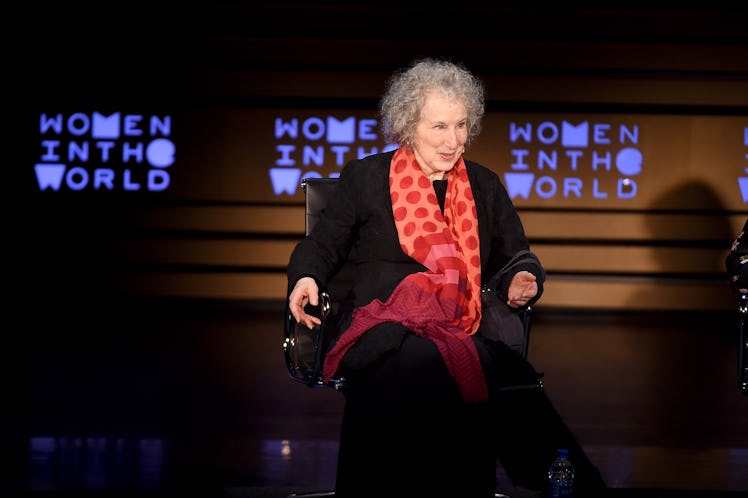
This Detail About Season 2 Of 'Handmaid's' From The Author Makes It So Much Creepier
On Friday, April 13, at the Women in the World conference in New York City, Margaret Atwood discussed season 2 of The Handmaid's Tale. Over the course of the onstage conversation, which was moderated by New York Times columnist Michelle Goldberg, Atwood talked about what she's been seeing from the team behind the show, which is especially interesting as the show is going beyond the bounds of the 1985 novel. The author seems to be impressed with the dedication behind the scenes, and she joked that the upcoming season is not just "brutal," but "brutal and riveting."
"We're going to the colonies, which were always there in the book. So cleaning up toxic waste, generally bad for your help," Atwood hinted about the second season, which begins on Hulu on April 25. She explained that the main difference between the book and the series is that in the book, as it was a first-person perspective, you can only get the narrative that the main character, Offred, sees. "In the television series, we can follow characters that disappear from the view of the central narrator," Atwood said. "They've built out the cast of characters, they've taken the narrative, as it were, behind the scenes to places that the narrator could never go to in the book."
To that end, Atwood gave a hint about what's to come in terms of learning more about Aunt Lydia. "In anybody's life, there are a series of choices that a person can make. So what choices did the younger Aunt Lydia have offered to her? Or let us say, how did people end up in charge of nunneries in the Middle Ages? It's a powerful position within a frame — you could only be powerful to this extent, but at least you were powerful within that sphere," Atwood said.
Atwood said that the crew on the show is "extremely invested" and that they have stuck to a rule that Atwood herself kept in writing the book, which has always been a facet about the writing process that makes the already scary story even scarier. In writing The Handmaid's Tale, Atwood did not include any idea that did not happen in the real world. For instance, in Romania, in the late 1960s, contraception and abortion was outlawed to force women to have more children to increase the birth rate, similar to how women in Handmaid's are forced to get pregnant.
"Nothing goes in that is not already been done somewhere someplace, so all of those things need to be researched. If the writing team comes up with something, they need to be able to show where it came from. So they are very dedicated, and they're not pulling any punches," Atwood said about the show.
Atwood also discussed the visual look of the show, explaining that "it's so beautiful, it's so lush, the photography is so beautiful, the colors are so attractive" for a reason. "The showrunner [Bruce Miller] said, 'Well we have this idea of dystopia where everything's really grim and full of dust and sand,' and he said, 'That's not usually the way things are. They're often very nice for some people,'" she said. (Which, yes, sounds like the reverse of The Handmaid's Tale infamous "Better never means better for everyone ... It always means worse for some" quote.)
When it comes to real-world examples of the oppression of women, Atwood said that she has not given up hope on the United States — "yet" — and that the marches we're seeing proves that many people also have not given up on freedom in this country. "And they haven't yet started shooting protest marchers, that's always a bad sign," Atwood said. She added that protesters dressing and acting as handmaids is "quite brilliant" since it's both an effective image and a quiet action that you can't get kicked out of a space for.
"When people woke up on November 9th and were in a different show, I think if anything, they became more dedicated to it," Atwood said about The Handmaid's Tale show and the 2016 presidential election. "This is a group of people who are very invested in the show. It's not just a job for them, and I think that's one reason it has been so good. You can tell they're a very talented group of people, and they're giving it their best."